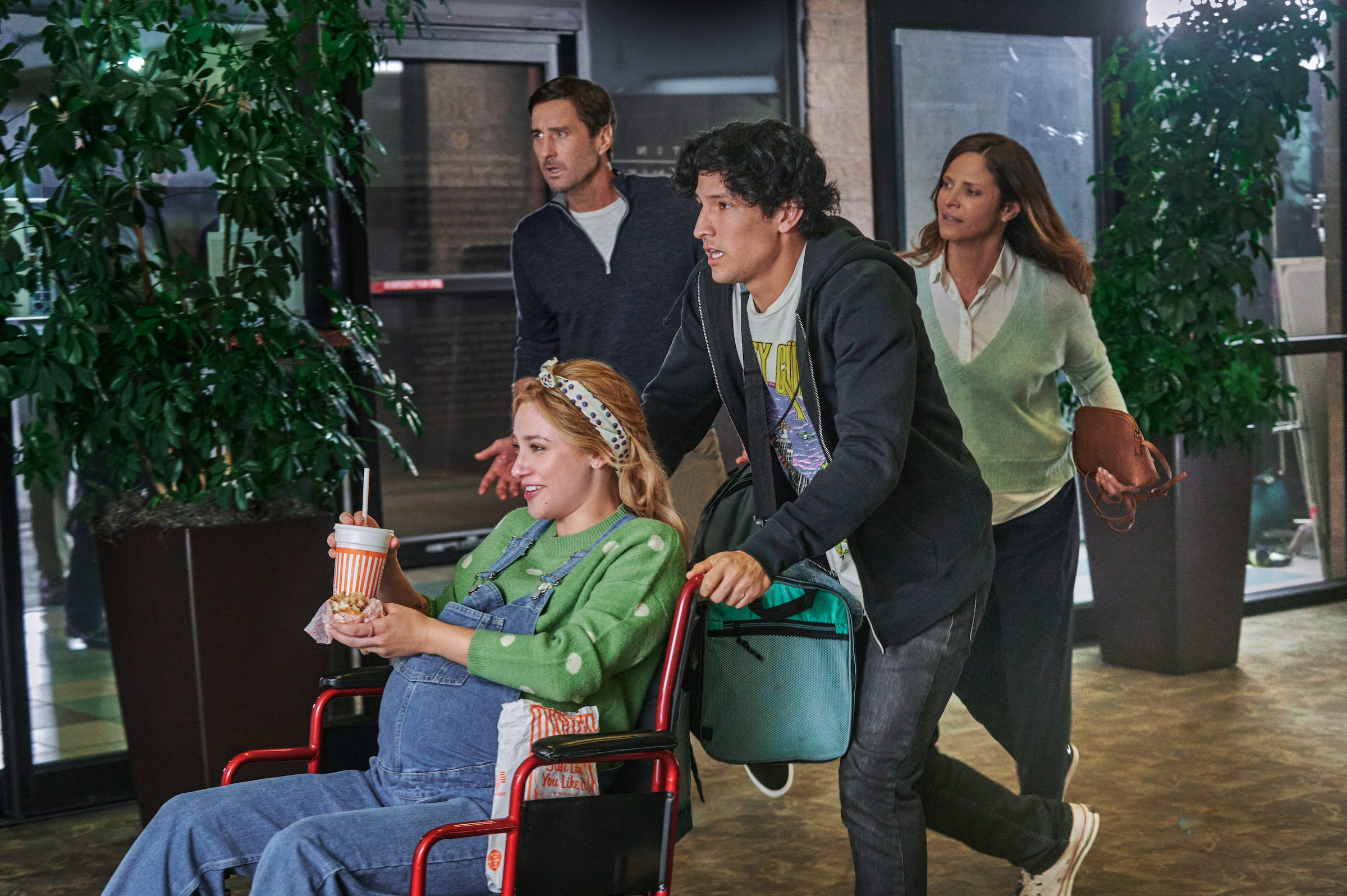There’s a comforting idea at the heart of the ruminative romantic comedy Look Both Ways, a suggestion that no life choice is ever the wrong one—everything depends on what you do with that choice. Lili Reinhart stars as two versions of the same woman, Natalie, who, at the film’s opening, has just graduated from college in Austin and is ready to embark on her five-year plan for success. She and her best friend, Cara (Aisha Dee), are headed for Los Angeles, where Natalie will launch her dream career as an animator. But the other Natalie is hit with a serious quandary: she finds herself pregnant after a one-night tumble with another close friend, Gabe (Danny Ramirez). She decides to keep the baby, moving back in with her parents—played by Luke Wilson and Andrea Savage—and involving Gabe in the baby’s birth and upbringing, though she keeps him at arm’s length romantically.
A filmmaker can do a lot with this Sliding Doors-style idea; there’s also plenty that could send it careering off the rails. But Look Both Ways has a mild sweetness that makes it go down easy. Written by April Prosser and directed by Wanuri Kahiu, the film toggles between the Natalies of these two very different worlds, one climbing the career ladder rung by shaky rung, the other stuck at home with an infant she is, at first, not sure what to do with. The point isn’t to degrade one choice and celebrate the other, but to show how human beings often find happiness exactly in the place they’re not looking.
Los Angeles Natalie lands, early on, what she thinks will be her dream job: working as an assistant to the filmmaker she most admires, Lucy (Nia Long), your classic demanding-but-fair boss. On the way to getting that job, she meets a cute guy, Jake (David Corenswet), and after becoming friends, they embark on a tentative but promising romantic relationship. Then Natalie hits a bump in the road: Lucy informs her that her drawings are derivative, that she needs to find her own style. The news, to this perhaps overconfident early-twenty-something, is crushing. It also shakes up her romance with Jake.
Read more: Here’s Everything New on Netflix in August 2022—and What’s Leaving

Meanwhile, mom-Natalie is miserable in her own way. Her parents, having grown used to their empty nest, are at first none too happy to see her back at home, much less in her particular state. Natalie is lucky that she has an amazing support system, and a devoted parenting partner in Jake. But she’s still unhappy. (In one of the movie’s most touching and unexpected scenes, her mother explains what postpartum depression is—it simply hasn’t occurred to Natalie that hormonal shifts are doing a number on her.) Before long, she settles into the groove of motherhood, and there’s no doubt that she loves her daughter. But she still thinks about the other life she might have had, the one we’re seeing in the movie’s glimpses into the other Natalie’s world. We know what she doesn’t: that even if the grass looks greener on the other side, it rarely is. And neither Natalie can see that a dream deferred isn’t the same as a dream destroyed.
Reinhart is an effortlessly appealing performer, though she’s not all sunshine: she can summon an understated moody sharpness when she needs to, particularly in her mom-Natalie scenes, where Jake is usually the one on the receiving end of her mini-tirades. (As played by Ramirez, this character has an exceptionally long fuse.) Yet there’s not much dramatic tension in Look Both Ways. For one thing, it’s impossible to ignore the reality that mom-Natalie gets to raise her child in a beautiful house with doting, helpful grandparents on call whenever necessary. We see her working briefly as a barista, but once the baby comes, that job seems to go out the window. There’s no denying the relative cushiness of her particular single-mom life.
It’s also possible that anti-abortion proselytizers could seize on Look Both Ways to make the point that having the child is always the best way, the only way—but that’s not how the filmmakers present Natalie’s decision. If anything, the movie is a reminder that anyone who believes in a woman’s fundamental right to choose also needs to respect whatever choice she makes. It’s also important to remember that this is a fantasy, not a guidebook for making serious life decisions. The chief idea behind Look Both Ways is that there’s usually a way to make lemonade with the lemons life throws at you. The main thing is for young adults to be ready for that lemon assault, because they never really stop coming.
More Must-Reads from TIME
- Caitlin Clark Is TIME's 2024 Athlete of the Year
- Where Trump 2.0 Will Differ From 1.0
- Is Intermittent Fasting Good or Bad for You?
- The 100 Must-Read Books of 2024
- Column: If Optimism Feels Ridiculous Now, Try Hope
- The Future of Climate Action Is Trade Policy
- FX’s Say Nothing Is the Must-Watch Political Thriller of 2024
- Merle Bombardieri Is Helping People Make the Baby Decision
Contact us at letters@time.com